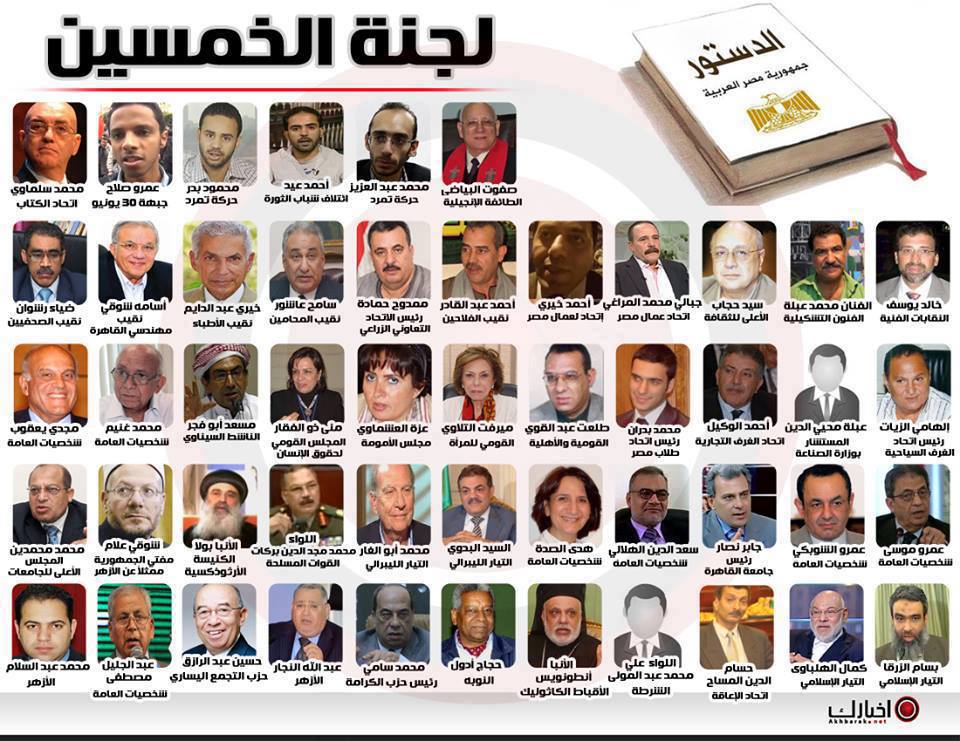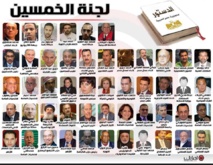Voting on the 247 articles began on Saturday with 48 members of the 50-member panel present, and is to resume Sunday afternoon, state news agency MENA reported.
It said 138 articles were approved Saturday.
After the army ousted Morsi in July, Egypt's interim rulers suspended the 2012 constitution, which had been hastily drafted during his year in power by a panel dominated by Morsi's Islamist allies.
The roadmap stipulates that a referendum on the constitution be held by the end of the year, but officials have said it is now expected in the second half of January.
Articles approved Saturday included one stipulating that Islamic sharia law will be the main source of legislation as was the case during the regime of toppled ruler Hosni Mubarak.
The other main article approved was one forbidding the formation of religious parties or parties based on religious grounds.
This is expected to have consequences for the Freedom and Justice Party, the political arm of the banned Muslim Brotherhood, most of whose top leaders including Morsi are behind bars since July.
"A party can have a religious identity, but it has to abide by laws, the constitution and the Egyptian civil state," panel chief Amr Mussa, who once headed the Arab League and served as Mubarak's foreign minister, told AFP.
The panel includes representatives from civil society, political parties, institutions such as the army and police, and the Coptic church.
But it includes just two Islamists, neither of whom is from the Muslim Brotherhood, which won a series of polls following Mubarak's ouster but has in recent months been the target of a sweeping crackdown that has seen more than 1,000 people killed.
Mussa told reporters that the panel "reached an agreement on the entire constitution which has been extensively revised" from the one adopted under Morsi.
But rights groups and activists criticised the draft, particularly Article 204, which would allow military trials of civilians accused of "direct attacks" on the armed forces, a provision they fear could be applied to protesters, journalists and dissidents.
The article says that "no civilian can be tried by military judges, except for crimes of direct attacks on armed forces, military installations and military personnel."
Secular activists oppose military trials
Secular activists have demonstrated against Article 204, and security forces arrested prominent activist Alaa Abdel Fattah this week for an unauthorised demonstration against military trials of civilians.
On Saturday Ahmed Maher, one of the leaders of the popular uprising against Mubarak, turned himself in after being ordered detained for holding a separate unauthorised demonstration in Cairo.
Maher arrived at a court in the capital accompanied by dozens of chanting supporters, whom police dispersed with tear gas.
Activists and rights groups say that in addition to allowing military trials of civilians the draft charter also fails to curb the powers and privileges of Egypt's military.
Article 234 stipulates that the defence minister be appointed in agreement with the Supreme Council of the Armed Forces, but panel spokesman Mohammed Salmawy told AFP this clause will be applicable only for the first two presidential terms.
The draft also ensures that the military's budget remains beyond civilian scrutiny.
Mahmoud Badr, representative of the Tamarod movement, which spearheaded the campaign against Morsi, expressed satisfaction with the provisions concerning the military.
"This constitution realises the hopes and ambitions of the Egyptians after the revolt of June 30," he said, referring to the day when millions took to the streets calling for Morsi's resignation.
"Given the attacks on military forces these days, I am satisfied with the wording which puts limits on military trials of civilians," he said, apparently referring to a spate of attacks on the security forces, mainly in the restive Sinai peninsula.
Bishop Paula, who represents the Coptic Christian church on the panel, said: "The church is happy with the last version of the constitution. Every single Egyptian can find an article in this constitution that satisfies him."
------------------------------------------------------------------------------------------------
It said 138 articles were approved Saturday.
After the army ousted Morsi in July, Egypt's interim rulers suspended the 2012 constitution, which had been hastily drafted during his year in power by a panel dominated by Morsi's Islamist allies.
The roadmap stipulates that a referendum on the constitution be held by the end of the year, but officials have said it is now expected in the second half of January.
Articles approved Saturday included one stipulating that Islamic sharia law will be the main source of legislation as was the case during the regime of toppled ruler Hosni Mubarak.
The other main article approved was one forbidding the formation of religious parties or parties based on religious grounds.
This is expected to have consequences for the Freedom and Justice Party, the political arm of the banned Muslim Brotherhood, most of whose top leaders including Morsi are behind bars since July.
"A party can have a religious identity, but it has to abide by laws, the constitution and the Egyptian civil state," panel chief Amr Mussa, who once headed the Arab League and served as Mubarak's foreign minister, told AFP.
The panel includes representatives from civil society, political parties, institutions such as the army and police, and the Coptic church.
But it includes just two Islamists, neither of whom is from the Muslim Brotherhood, which won a series of polls following Mubarak's ouster but has in recent months been the target of a sweeping crackdown that has seen more than 1,000 people killed.
Mussa told reporters that the panel "reached an agreement on the entire constitution which has been extensively revised" from the one adopted under Morsi.
But rights groups and activists criticised the draft, particularly Article 204, which would allow military trials of civilians accused of "direct attacks" on the armed forces, a provision they fear could be applied to protesters, journalists and dissidents.
The article says that "no civilian can be tried by military judges, except for crimes of direct attacks on armed forces, military installations and military personnel."
Secular activists oppose military trials
Secular activists have demonstrated against Article 204, and security forces arrested prominent activist Alaa Abdel Fattah this week for an unauthorised demonstration against military trials of civilians.
On Saturday Ahmed Maher, one of the leaders of the popular uprising against Mubarak, turned himself in after being ordered detained for holding a separate unauthorised demonstration in Cairo.
Maher arrived at a court in the capital accompanied by dozens of chanting supporters, whom police dispersed with tear gas.
Activists and rights groups say that in addition to allowing military trials of civilians the draft charter also fails to curb the powers and privileges of Egypt's military.
Article 234 stipulates that the defence minister be appointed in agreement with the Supreme Council of the Armed Forces, but panel spokesman Mohammed Salmawy told AFP this clause will be applicable only for the first two presidential terms.
The draft also ensures that the military's budget remains beyond civilian scrutiny.
Mahmoud Badr, representative of the Tamarod movement, which spearheaded the campaign against Morsi, expressed satisfaction with the provisions concerning the military.
"This constitution realises the hopes and ambitions of the Egyptians after the revolt of June 30," he said, referring to the day when millions took to the streets calling for Morsi's resignation.
"Given the attacks on military forces these days, I am satisfied with the wording which puts limits on military trials of civilians," he said, apparently referring to a spate of attacks on the security forces, mainly in the restive Sinai peninsula.
Bishop Paula, who represents the Coptic Christian church on the panel, said: "The church is happy with the last version of the constitution. Every single Egyptian can find an article in this constitution that satisfies him."
------------------------------------------------------------------------------------------------









 Home
Home Politics
Politics











